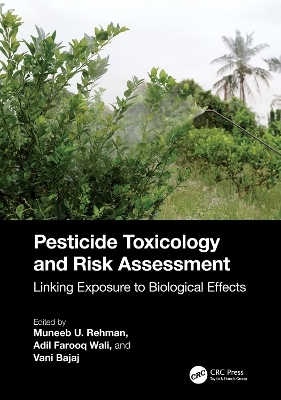
Pesticide Toxicology and Risk Assessment
CRC Press (Verlag)
978-1-032-10265-8 (ISBN)
With the emergence of new pesticide combinations and application methods, assessing their potential risks to non-target organisms and human well-being becomes paramount. Pesticide Toxicology and Risk Assessment focuses on the need and strategies for safe and efficient use of pesticides. It offers insights from toxicogenomics, enabling an understanding of the genetic and epigenetic factors influencing human susceptibility to chemical toxicity, thereby quantifying their impacts.
This book underscores the significance of risk assessment methodologies considering real-time variables influencing pesticide exposure to the environment and humans. It provides comprehensive details about models designed to evaluate risks across a spectrum of scenarios, from worst-case to real-time situations, while outlining strategies to mitigate these risks proactively. Furthermore, this book delves into the critical need for conducting field studies, particularly in addressing innovative combinations and application techniques.
Key Features:
• Covers toxicogenomic insights, delving into genetic and epigenetic impacts on human susceptibility to chemical toxicity
• Provides insight into necessary field studies for new pesticide approaches
• Aids pesticide manufacturers with risk assessment and effective formulation insights
As an aid for regulatory bodies, the book facilitates the evaluation of risks linked to both established and innovative pesticides, promoting informed decisions on usage by integrating risk reduction approaches. Simultaneously, it serves as a valuable guide for pesticide manufacturers, offering insights into using risk assessment tools to develop secure and effective pesticide blends. This guidance expedites the introduction of novel pesticides that are efficient and safe for various applications.
Muneeb U. Rehman, Ph.D. is a Faculty member at the College of Pharmacy, King Saud University, Riyadh, Saudi Arabia. He holds a doctorate in Toxicology (specialization in cancer biology and natural product research) from Jamia Hamdard, New Delhi, India. Dr. Rehman has more than 10 years of research and teaching experience in toxicology, cancer biology, natural product pharmacology, and pharmacogenomics. Adil Farooq Wali, Ph.D. is a Faculty member at RAK College of Pharmacy Sciences, RAK Medical and Health Sciences University, Ras Al Khaimah, United Arab Emirates. He earned a doctorate degree in pharmaceutical Sciences from University of Kashmir, Srinagar, India. Currently, Dr. Wali is engaged in studying molecular pharmacology of natural products and plant extracts and incorporates global health perspectives, most notably the use of herbal medicines in migrant groups and the impact of functional foods and local medicines on population health. Vani Bajaj is a Regulatory Affair Associate at CW Retail, Melbourne, Australia. She is Maters in Toxicology from Jamia Hamdard, New Delhi, India. She has worked with some major regulatory affair companies including manufacturers and consulting in different sectors. Ms. Bajaj has more than five years of experience in safety risk assessments for pesticides, cosmetics, and industrial chemicals.
1. ADVANCES IN RISK ASSESSMENT OF NANO PESTICIDES 2. APPLICATION OF OMICS TECHNOLOGY IN PESTICIDE TOXICOLOGY 3. PESTICIDE EXPOSURE MONITORING IN HUMANS 4. APPLICATION OF PROBABILISTIC MODELS IN PESTICIDE RISK ASSESSMENT 5. ASSESSMENT OF PESTICIDE MIXTURE EFFECTS 6. CHALLENGES AND OPPORTUNITIES IN PESTICIDE REGULATIONS 7. EPIGENOME CONCEPT AND PESTICIDE EFFECTS 8. EXPOSOME CONCEPT IN PESTICIDE MONITORING 9. INTRODUCTION TO PESTICIDE TOXICOLOGY AND RISK ASSESSMENT 10. THE IMPACT OF PESTICIDES ON HUMAN HEALTH AND ECOLOGICAL SYSTEMS EPIDEMIOLOGY AND EVALUATION 11. PESTICIDE EXPOSURE MONITORING IN HUMANS 12. RECENT ADVANCES AND PROGRESS IN THE APPLICATION OF VARIOUS MODELS FOR TOXIC PESTICIDE REMOVAL FROM WASTEWATER 13. RISK ASSESSMENT OF PESTICIDES IN AQUATIC ECOSYSTEMS
| Erscheinungsdatum | 31.05.2024 |
|---|---|
| Zusatzinfo | 25 Tables, black and white; 19 Line drawings, black and white; 1 Halftones, black and white; 20 Illustrations, black and white |
| Verlagsort | London |
| Sprache | englisch |
| Maße | 178 x 254 mm |
| Gewicht | 453 g |
| Themenwelt | Naturwissenschaften ► Biologie ► Biochemie |
| Naturwissenschaften ► Geowissenschaften ► Geologie | |
| Weitere Fachgebiete ► Land- / Forstwirtschaft / Fischerei | |
| ISBN-10 | 1-032-10265-9 / 1032102659 |
| ISBN-13 | 978-1-032-10265-8 / 9781032102658 |
| Zustand | Neuware |
| Informationen gemäß Produktsicherheitsverordnung (GPSR) | |
| Haben Sie eine Frage zum Produkt? |
aus dem Bereich


